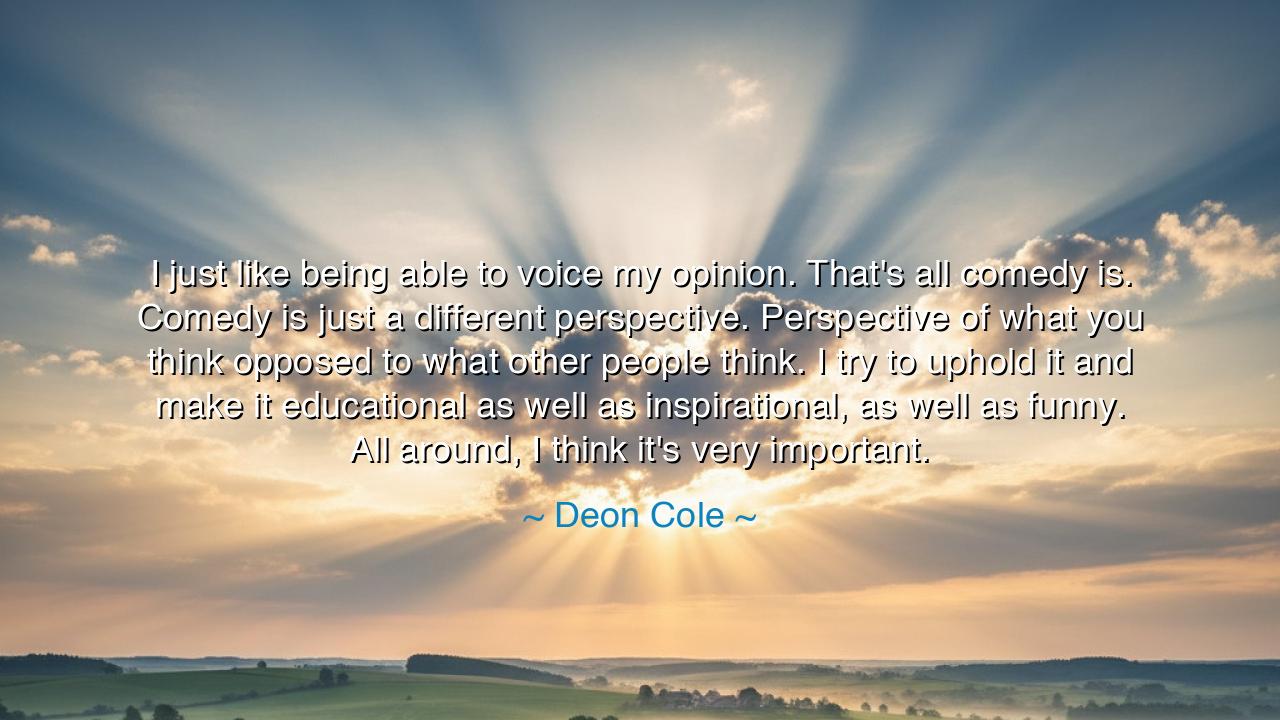
I just like being able to voice my opinion. That's all comedy is.
I just like being able to voice my opinion. That's all comedy is. Comedy is just a different perspective. Perspective of what you think opposed to what other people think. I try to uphold it and make it educational as well as inspirational, as well as funny. All around, I think it's very important.






In the insightful and resonant words of Deon Cole, the master of wit and wisdom, we hear a truth that transcends laughter and reaches into the very heart of human expression: “I just like being able to voice my opinion. That's all comedy is. Comedy is just a different perspective. Perspective of what you think opposed to what other people think. I try to uphold it and make it educational as well as inspirational, as well as funny. All around, I think it's very important.” Beneath the rhythm of his speech lies not merely the craft of a comedian, but the philosophy of a thinker, a modern-day sage who understands that comedy — the art of laughter — is one of the most powerful instruments of truth that humanity has ever known.
The origin of this quote comes from Cole’s reflections on his career in comedy — a path that demands courage, clarity, and vulnerability. To stand before others and turn observation into laughter is no easy task; it is a calling that combines the philosopher’s eye with the poet’s heart. When Deon Cole speaks of “voicing his opinion,” he speaks of more than jokes. He speaks of the sacred duty of the storyteller — to reveal what others fear to say, to offer perspective, and to help his audience see the world anew. For in every great comic, from the jesters of ancient courts to the modern stages of the world, there beats the same purpose: to awaken thought through laughter and to shine light on truth through humor.
To say that “comedy is just a different perspective” is to affirm one of life’s deepest laws — that reality itself is shaped by the way we perceive it. The ancient Stoics taught that it is not events that disturb us, but our judgments about them. In much the same way, comedy transforms pain into laughter by changing the angle of vision. What once seemed unbearable becomes absurd; what once caused sorrow now inspires wisdom. The comedian becomes a mirror of the human condition, revealing folly, exposing hypocrisy, yet doing so with grace and empathy. Through humor, the soul finds release, and the mind, enlightenment. In this, Cole walks in the footsteps of the great jesters and philosophers alike, blending insight with laughter, and truth with joy.
Consider the tale of Diogenes of Sinope, the ancient Greek philosopher often called the “original comedian.” He wandered through the streets of Athens carrying a lantern in daylight, claiming to search for an honest man. His humor, sharp and unrelenting, revealed the absurdity of pride and the emptiness of pretense. Though men laughed at him, they also learned from him. Like Deon Cole, Diogenes wielded humor as a weapon of wisdom and education — not to mock for cruelty’s sake, but to awaken the sleeping conscience of his time. The laughter he evoked was not the laughter of ignorance, but of realization. And in this way, comedy becomes education for the soul, teaching through delight what sermons cannot always teach through solemnity.
When Cole speaks of making his art “educational as well as inspirational,” he honors this noble lineage. He reminds us that laughter alone, though delightful, is not enough; it must uplift, enlighten, and expand the listener’s horizon. To teach through laughter is to speak the language of the heart — a language that disarms resistance and opens minds. A joke can do what an argument cannot: it can unite people across division, revealing our shared humanity. Comedy, when guided by purpose, becomes the voice of compassion, wrapped in the robe of wit. It teaches that wisdom need not always whisper from the mountaintop — sometimes, it bursts forth from a stage, carried on waves of laughter.
Yet, to voice one’s opinion is also an act of courage. In every age, truth-tellers face ridicule, misunderstanding, and resistance. The comedian stands at the crossroads between acceptance and rejection, speaking truth in a form the world can bear. Cole’s commitment to “uphold” his perspective — to stay true to himself — is the mark of integrity. He understands that to inspire, one must first be authentic; to teach, one must first be humble; and to make others laugh, one must first understand pain. For all comedy, at its heart, is born from the human struggle to find light amid darkness. The laugh we share is a triumph — a declaration that life, though hard, can still be beautiful.
Let this, then, be the lesson of Deon Cole’s wisdom: Speak your truth. Share your perspective. Let your humor, your art, your voice — whatever form it takes — be not only entertaining, but uplifting and illuminating. Do not fear disagreement, for differing perspectives are the forge of understanding. Seek always to make your words not weapons of division, but bridges of insight. And when you can, let your lightheartedness heal, for laughter is the medicine of the weary spirit.
And so, dear listener, remember that comedy, like life, is sacred play. It reminds us that perspective is everything — that joy can be found even in difficulty, and wisdom even in laughter. As Deon Cole teaches, to make others laugh while making them think is one of the highest forms of art. Be bold in your expression, be kind in your truth, and above all, be inspirational in your perspective. For the world does not need more silence — it needs voices that can make it both laugh and awaken, all at once.






AAdministratorAdministrator
Welcome, honored guests. Please leave a comment, we will respond soon